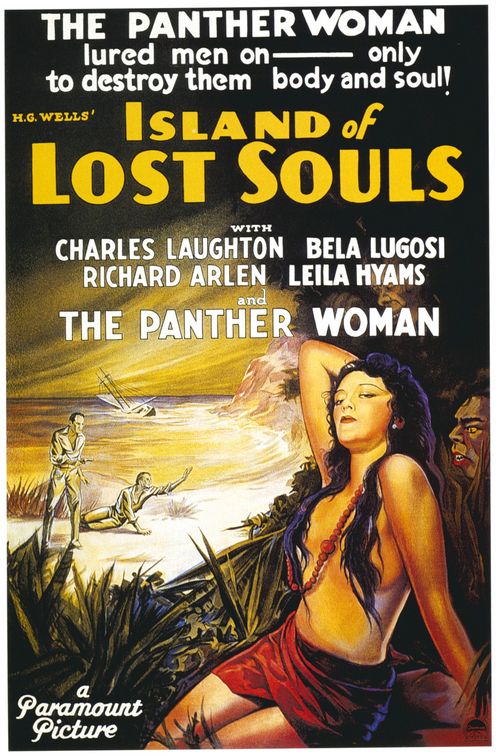
The Secret Cinema presents ISLAND OF LOST SOULS *
Thursday, July 30th, 6 PM
American Philosophical Society Museum
Philosophical Hall
104 South Fifth Street, Philadelphia
215-440-3440
*
 BY DAN BUSKIRK FILM CRITIC Recently I was chatting with my three year old about his great passion, animals. Sometimes you forget that a fresh mind needs all angles explained to them. “We’re animals too,” I said. His eyes grew wide. “No way!” he shook his head in disbelief. I’m do not think I convinced him although he stopped challenging me after I repeated the fact a few times; he saw the gap between humans and the world’s critters as being too wide to be under the same umbrella.
BY DAN BUSKIRK FILM CRITIC Recently I was chatting with my three year old about his great passion, animals. Sometimes you forget that a fresh mind needs all angles explained to them. “We’re animals too,” I said. His eyes grew wide. “No way!” he shook his head in disbelief. I’m do not think I convinced him although he stopped challenging me after I repeated the fact a few times; he saw the gap between humans and the world’s critters as being too wide to be under the same umbrella.
I’d imagine the general public was similarly horrified upon learning of man and beast’s common ancestry and in the 1930s , as Darwin’s evolutionary theory of natural selection became publicly accepted, their fears were exploited by one of the nastiest of the ’30s horror films, Paramount’s The Island of Lost Souls. Made just before the Hayes Code began to restrict the content of Hollywood movies, Lost Souls is what writer H.G. Wells described as his “youthful blasphemy,” a tale that traffics in torture, bestiality and sadism. The film was banned in the U.K. for twenty-five years, labeled by the censors as “against the laws of nature.” Seen today, despite it thirties theatricality, Lost Souls unnerves like few films of its era, comparable only to Tod Browning’s sideshow spectacle, Freaks in its vicious and morbid world view.
The films opens with its lead Parker (Richard Arlen) awaking from a nightmare in a ship’s infirmary. He’s been rescued from a shipwreck and after a conflict with the Captain, finds himself dropped overboard and left stranded on an unnamed Pacific island where Dr.Moreau (Charles Laughton, in his first Hollywood leading role) has set up shop. Here Parker discovers that, through torturous medical procedures, Moreau is turning a menagerie of animals into half-men/half-beasts who worship the Doctor like a God. The creatures, a truly creepy mix of odd-looking actors in crude hairy make-up (including Schlitze, the “Pinhead” from Freaks), recite the laws Dr. Moreau has handed down to them: do not run on all fours, do not eat meat and do not spill blood. Bela Lugosi, already a star from Universal’s Dracula, is the werewolf-like creature who leads the chanting of these laws, meant to keep the beasts from devolving into wild animals, ending each command with the question, “Are We Not Men?” (a query the band Devo would appropriate decades later).
For audiences just coming to grips with the ramifications of our shared ancestry with animals, Lost Souls’ unnerving scenes of men behaving like mentally-dim beasts must have certainly hit a nerve. Mixed in is the fascination with savage pageantry audiences were just beginning to witness in theatrical short subjects that took moviegoers around the globe to witness the exotic practices of native cultures. Then there is the painful transformation of bodies, a theme filmmaker David Cronenberg continues to mine today. And those screams that emanate from Dr. Moreau’s lab, which he calls “The House of Pain”; perhaps a forerunner of the “torture porn” genre that gave us the Hostel and Saw franchises in the last decade?
Moreau is presented as a prissy sadist, completely removed from any thoughts of morality; a man who plays God and loses his humanity, a man who denies his kinship with animals and therefore reveals the beast within. In perhaps its most transgressive touch (and one not found in Wells’ novel) Moreau seems to have a prurient as well as scientific interest in having Parker couple with the nearly human Panther Woman (Katherine Burke, whose feline looks helped her win the role through a nation-wide contest). But you know what fate is waiting for this maddest of scientists when he wonders “Do you know what it means to feel like God?” When he gets his, it is so lingering and ghastly you almost feel pity. In Wells’ novel Moreau’s death is not witnessed, it is left to our imagination. Director Erle Kenton lets us revel n his downfall and join the crowd of howling beasts calling for his blood. Of course it s satisfying to witness his cruel comeuppance; are we not men?
*Free admission includes refreshments, access to the exhibit DIALOGUES WITH DARWIN and a post-screening discussion moderated by Phawker film critic Dan Buskirk.
SECRET CINEMA WEBSITE: www.thesecretcinema.com
APS MUSEUM WEBSITE: www.apsmuseum.org
